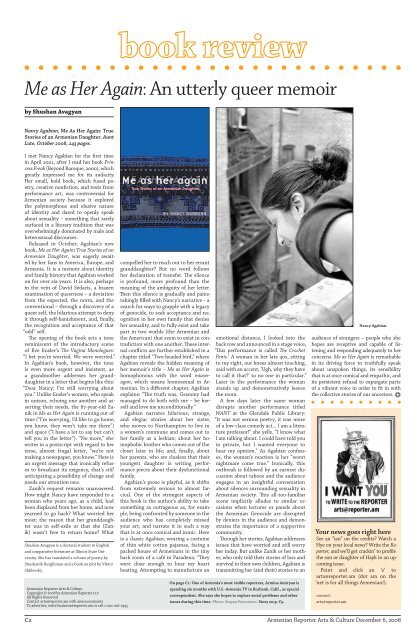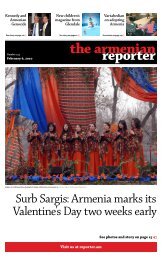You also want an ePaper? Increase the reach of your titles
YUMPU automatically turns print PDFs into web optimized ePapers that Google loves.
ook reviewMe as Her Again: An utterly queer memoirby Shushan AvagyanNancy Agabian, Me As Her Again: TrueStories of an <strong>Armenian</strong> Daughter. AuntLute, October 2008, 243 pages.I met Nancy Agabian for the first timein April 2001, after I read her book PrincessFreak (Beyond Baroque, 2000), whichgreatly impressed me for its audacity.Her small, bold book, which fused poetry,creative nonfiction, and texts fromperformance art, was controversial for<strong>Armenian</strong> society because it exploredthe polymorphous and elusive natureof identity and dared to openly speakabout sexuality – something that rarelysurfaced in a literary tradition that wasoverwhelmingly dominated by male andheterosexual discourses.Released in October, Agabian’s newbook, Me as Her Again: True Stories of an<strong>Armenian</strong> Daughter, was eagerly awaitedby her fans in America, Europe, andArmenia. It is a memoir about identityand family history that Agabian workedon for over six years. It is also, perhapsin the vein of David Sedaris, a brazenexamination of queerness – a deviationfrom the expected, the norm, and theconventional – through a discovery of aqueer self, the hilarious attempt to denyit through self-banishment, and, finally,the recognition and acceptance of that“odd” self.The opening of the book sets a tonereminiscent of the introductory sceneof Eve Ensler’s The Vagina Monologues:“I bet you’re worried. We were worried.”In Agabian’s book, however, the toneis even more urgent and insistent, asa grandmother addresses her granddaughterin a letter that begins like this:“Dear Nancy: I’m still worrying aboutyou.” Unlike Ensler’s women, who speakin unison, echoing one another and assertingtheir needs, the 87-year-old Zanikin Me as Her Again is running out oftime (“I’m worrying, I’d like to go home,you know, they won’t take me there”)and space (“I have a lot to say but can’ttell you in the letter”). “No more,” shewrites in a postscript with regard to herterse, almost frugal letter, “we’re notmaking a newspaper, you know.” Here isan urgent message that ironically refusesto broadcast its exigency, that’s stillanticipating a possibility of change andneeds our attention now.Zanik’s request remains unanswered.How might Nancy have responded to awoman who years ago, as a child, hadbeen displaced from her home, and nowyearned to go back? What worried hermost: the reason that her granddaughterwas in self-exile or that she (Zanik)wasn’t free to return home? WhatShushan Avagyan is a doctoral student in Englishand comparative literature at Illinois State University.She has translated a volume of poetry byShushanik Kurghinian and a book on plot by ViktorShklovsky.<strong>Armenian</strong> <strong>Reporter</strong> <strong>Arts</strong> & <strong>Culture</strong>Copyright © 2008 by <strong>Armenian</strong> <strong>Reporter</strong> llcAll Rights ReservedContact arts@reporter.am with announcementsTo advertise, write business@reporter.am or call 1-201-226-1995compelled her to reach out to her errantgranddaughter? But no word followsher declaration of transfer. The silenceis profound, more profound than themeaning of the ambiguity of her letter.Then this silence is gradually and painstakinglyfilled with Nancy’s narrative – asearch for ways to grapple with a legacyof genocide, to seek acceptance and recognitionin her own family that deniesher sexuality, and to fully exist and takepart in two worlds (the <strong>Armenian</strong> andthe American) that seem to exist in contradictionwith one another. These internalconflicts are further established in achapter titled “Two-headed bird,” whereAgabian reveals the hidden meaning ofher memoir’s title – Me as Her Again ishomophonous with the word miaseragan,which means homosexual in <strong>Armenian</strong>.In a different chapter, Agabianexplains: “The truth was, Grammy hadmanaged to do both with me – be herselfand love me unconditionally.”Agabian narrates hilarious, strange,and elegiac stories about her sister,who moves to Northampton to live ina women’s commune and comes out toher family as a lesbian; about her homophobicbrother who comes out of thecloset later in life; and, finally, abouther parents, who are clueless that theiryoungest daughter is writing performancepieces about their dysfunctionalfamily.Agabian’s prose is playful, as it shiftsfrom extremely serious to almost farcical.One of the strongest aspects ofthis book is the author’s ability to takesomething as outrageous as, for example,being confronted by someone in theaudience who has completely missedyour art, and narrate it in such a waythat is at once comical and ironic. Hereis a classic Agabian, wearing a costumeof thin white cotton pajamas, facing apacked house of <strong>Armenian</strong>s in the tinyback room of a café in Pasadena: “Theywere close enough to hear my heartbeating. Attempting to manufacture anemotional distance, I looked into theback row and announced in a stage voice,‘This performance is called The CrochetPenis.’ A woman in her late 40s, sittingto my right, our knees almost touching,said with an accent, ‘Ugh, why they haveto call it that?’ to no one in particular.”Later in the performance the womanstands up and demonstratively leavesthe room.A few days later the same womandisrupts another performance titledWANT at the Glendale Public Library:“It was not serious poetry, it was moreof a low-class comedy act... I am a literatureprofessor!” she yells. “I know whatI am talking about. I could have told youin private, but I wanted everyone tohear my opinion.” As Agabian confesses,the woman’s reaction is her “worstnightmare come true.” Ironically, thisoutbreak is followed by an earnest discussionabout taboos and the audienceengages in an insightful conversationabout silences surrounding sexuality in<strong>Armenian</strong> society. This all-too-familiarscene implicitly alludes to similar occasionswhen lectures or panels aboutthe <strong>Armenian</strong> Genocide are disruptedby deniers in the audience and demonstratesthe importance of a supportivecommunity.Through her stories, Agabian addressesissues that have worried and still worryher today. But unlike Zanik or her mother,who only told their stories of loss andsurvival to their own children, Agabian istransmitting her (and their) stories to anOn page C1: One of Armenia’s most visible reporters, Armine Amiryan isspending six months with U.S.-Armenia TV in Burbank, Calif., as specialcorrespondent. She says she hopes to explore social problems and otherissues during this time. Photo: Stepan Partamian. Story on p. C9.Nancy Agabian.audience of strangers – people who shehopes are receptive and capable of listeningand responding adequately to herconcerns. Me as Her Again is remarkablein its driving force to truthfully speakabout unspoken things, its sensibilitythat is at once comical and empathic, andits persistent refusal to expurgate partsof a vibrant voice in order to fit in withthe collective stories of our ancestors. Your news goes right hereSee an “ian” on the credits? Watch aHye on your local news? Write the <strong>Reporter</strong>,and we’ll get crackin’ to profilethe son or daughter of Hayk in an upcomingissue.Point and click an ‘e’ toarts@ reporter.am (dot am on the‘net is for all things <strong>Armenian</strong>!).connect:arts@reporter.amC2 <strong>Armenian</strong> <strong>Reporter</strong> <strong>Arts</strong> & <strong>Culture</strong> December 6, 2008
















